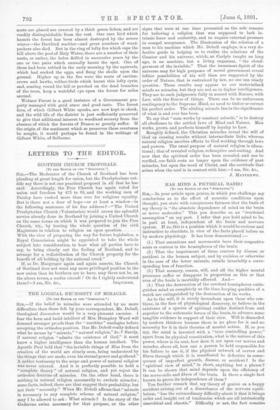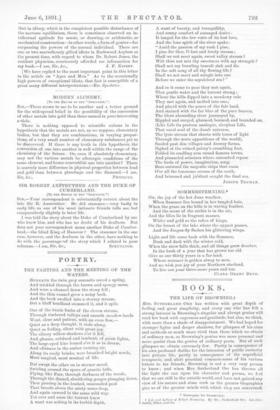HAS MIND A PHYSICAL BASIS?
[To THE EDITOR OP THE "SPECTATOR."]
Sin,—In your article upon genius, in which you challenge my conclusions as to the effect of neurotic conditions upon thought, you state with conspicuous fairness that the basis of my theory is "the absolute dependence of mind on the brain or nerve molecules." This you describe as an " assumption" on my part. I infer that you hold mind to be, in part at least, independent of the brain and nervous. system. If so, this is a position which it would be curious and instructive to elucidate, in view of the facts placed before us. by modern physiology. It has been demonstrated (1.) That sensations and movements have their respective seats or centres in the hemispheres of the brain.
(2.) That the impairment of these centres by disease or- accident in the human subject, and by excision or otherwise in the case of the lower animals, entails invariably a corre- sponding loss of function.
(3.) That memory, reason, will, and all the higher mental processes suffer or disappear in proportion as this or that area of the brain is morbidly affected. And—
(4.) That the destruction of the cerebral hemispheres extin- guishes mind as completely as the time-keeping qualities of watch are extinguished by the destruction of its works.
As to the will, it is surely incumbent upon those who con- tinue, in the face of physiological discovery, to believe in the existence of a species of spiritual rudder distinct from and superior to the automatic forces of the brain, to advance some tangible evidence in support of their view. Will is discarded by modern thinkers because there is no place for it and no- necessity for it in their theories of mental action. If, as you say, the mind is -invested with a "true controlling power,' apart from its physical constitution, what is the nature of this power, where is its seat, how does it act upon our nerves and muscles, above all, how can a person be held responsible for his failure to use it, if the physical network of nerves and fibres through which it is manifested be defective in conse- quence of imperfect growth, disease, or accident Is the "spiritual view of mind," in short, anything but a phrase It can be shown that mind depeiads upon the efficiency of the nerve-cells and fibres of the brain. Is there a single fact known to prove its independence of them ?
You further remark that my theory of genius as a happy accident arising out of a disturbance of the nervous equili- brium, "has the extraordinary difficulty about it that it brings. order and insight out of tendencies which are all intrinsically anarchical and chaotic." Difficulty or not, the fact remains that in idiocy, which is the completest possible disturbance of the nervous equilibrium, there is sometimes observed an in- tellectual aptitude for music, or drawing, or arithmetic, or mechanical construction—in other words, a form of genius—far surpassing the powers of the normal individual. There are one or two marvellously gifted idiots in Earlswood Asylum at the present time, with regard to whom Dr. Robert Jones, the resident physician, courteously afforded me information for
[We have replied to the most important point in this letter in the article on "Apes and Men." As to the occasionally high powers of exceptional idiots, that fact is susceptible of a great many different interpretations.—ED. Spectator.







































 Previous page
Previous page